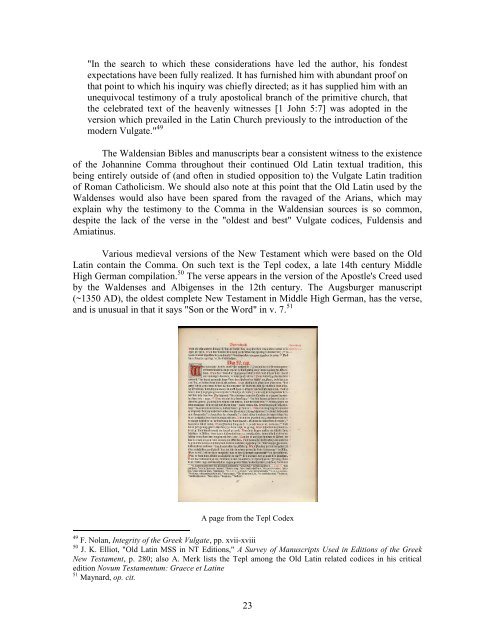A Defense of the Johannine Comma - Study to Answer.Net
A Defense of the Johannine Comma - Study to Answer.Net
A Defense of the Johannine Comma - Study to Answer.Net
You also want an ePaper? Increase the reach of your titles
YUMPU automatically turns print PDFs into web optimized ePapers that Google loves.
"In <strong>the</strong> search <strong>to</strong> which <strong>the</strong>se considerations have led <strong>the</strong> author, his fondest<br />
expectations have been fully realized. It has furnished him with abundant pro<strong>of</strong> on<br />
that point <strong>to</strong> which his inquiry was chiefly directed; as it has supplied him with an<br />
unequivocal testimony <strong>of</strong> a truly apos<strong>to</strong>lical branch <strong>of</strong> <strong>the</strong> primitive church, that<br />
<strong>the</strong> celebrated text <strong>of</strong> <strong>the</strong> heavenly witnesses [1 John 5:7] was adopted in <strong>the</strong><br />
version which prevailed in <strong>the</strong> Latin Church previously <strong>to</strong> <strong>the</strong> introduction <strong>of</strong> <strong>the</strong><br />
modern Vulgate." 49<br />
The Waldensian Bibles and manuscripts bear a consistent witness <strong>to</strong> <strong>the</strong> existence<br />
<strong>of</strong> <strong>the</strong> <strong>Johannine</strong> <strong>Comma</strong> throughout <strong>the</strong>ir continued Old Latin textual tradition, this<br />
being entirely outside <strong>of</strong> (and <strong>of</strong>ten in studied opposition <strong>to</strong>) <strong>the</strong> Vulgate Latin tradition<br />
<strong>of</strong> Roman Catholicism. We should also note at this point that <strong>the</strong> Old Latin used by <strong>the</strong><br />
Waldenses would also have been spared from <strong>the</strong> ravaged <strong>of</strong> <strong>the</strong> Arians, which may<br />
explain why <strong>the</strong> testimony <strong>to</strong> <strong>the</strong> <strong>Comma</strong> in <strong>the</strong> Waldensian sources is so common,<br />
despite <strong>the</strong> lack <strong>of</strong> <strong>the</strong> verse in <strong>the</strong> "oldest and best" Vulgate codices, Fuldensis and<br />
Amiatinus.<br />
Various medieval versions <strong>of</strong> <strong>the</strong> New Testament which were based on <strong>the</strong> Old<br />
Latin contain <strong>the</strong> <strong>Comma</strong>. On such text is <strong>the</strong> Tepl codex, a late 14th century Middle<br />
High German compilation. 50 The verse appears in <strong>the</strong> version <strong>of</strong> <strong>the</strong> Apostle's Creed used<br />
by <strong>the</strong> Waldenses and Albigenses in <strong>the</strong> 12th century. The Augsburger manuscript<br />
(~1350 AD), <strong>the</strong> oldest complete New Testament in Middle High German, has <strong>the</strong> verse,<br />
and is unusual in that it says "Son or <strong>the</strong> Word" in v. 7. 51<br />
A page from <strong>the</strong> Tepl Codex<br />
49 F. Nolan, Integrity <strong>of</strong> <strong>the</strong> Greek Vulgate, pp. xvii-xviii<br />
50 J. K. Elliot, "Old Latin MSS in NT Editions," A Survey <strong>of</strong> Manuscripts Used in Editions <strong>of</strong> <strong>the</strong> Greek<br />
New Testament, p. 280; also A. Merk lists <strong>the</strong> Tepl among <strong>the</strong> Old Latin related codices in his critical<br />
edition Novum Testamentum: Graece et Latine<br />
51 Maynard, op. cit.<br />
23


